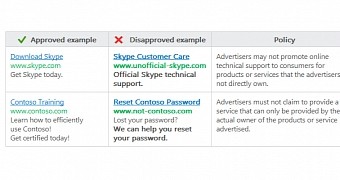The two most dominant forces in the world of search engines have announced substantial changes to their online advertising policies, with each company banning one type of acceptable ad on their network.
The first to act was Google, who announced on Wednesday that they would disallow any type of payday loans via their AdWords service.
Google says "no more" to payday loaners
The company says that from July 13, 2016, they won't allow payday loan ads where the credit is due within 60 days of the date of issue. This new policy is global, but for the US, Google will also ban ads for loans with an APR of 36 percent or higher.
Google explains the new policy is specifically aimed at harmful ads that don't have the user's best interests at heart, and will not affect ads for trusted loaning services such as for mortgages, car loans, student loans, commercial loans, and revolving lines of credit.
Google's ban on payday loans comes after some intense scrutiny from the US government, who's been cracking down on these types of businesses. The move will also cost the company millions in revenue.
Microsoft outlaws ads for tech support scams
One day after Google's announcement came more good news, this time from Microsoft, who also moved to clean up their advertising business.
The company announced changes to its advertising policy, banning ads that provide tech support or password recovery services. These types of ads were commonly seen in tech support scams, something that over 175,000 Microsoft customers complained about last year.
The policy changes Microsoft made are the following and are directly aimed at companies that provide support for services they don't own (Company X providing support for Company Y's service) and companies that offer services that only the service owner can (password or data recoveries).
“ Advertisers may not promote online technical support to consumers for products or services that the advertisers do not directly own. ”
“ Advertisers must not claim to provide a service that can only be provided by the actual owner of the products or service advertised. ”

 14 DAY TRIAL //
14 DAY TRIAL //